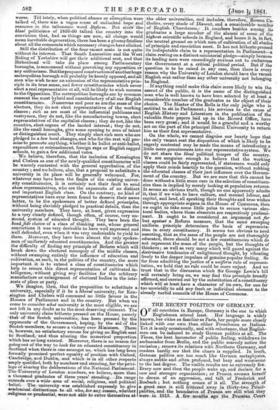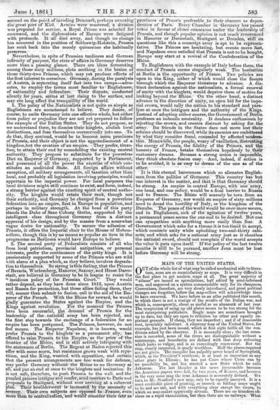THE RECENT POLITICS OP GERMANY.
OF all countries in Europe, Germany is the one to which Englishmen attend least. Her language is widely known, her cities as familiar as Paris, her people more closely linked, with our own than either Frenchmen .or Italians. Yet it is only occasionally, and ,with reluctance, that English- men can be induced to study German politics at all. The Times, the best barometer of public feeling, withdraws its ambassador from Berlin, and the public scarcely notice the omission ; renews its relations with Northern Germany, and readers hardly see that the chasm is supplied. In truth, German politics are too much like German metaphysics, always subtle and often profound, but hazy and wearisome to the last degree. The visible, results are so extremely few. Every now and then the people wake up, and declare for a new •and stronger organization ; or Prussia arouses herself to dream of an aggression, and talk of Frederick and Rosbach ; but nothing comes of it all. The strength of a great race is still frittered away in thirty-two Princi- palities, and the boundaries of Prussia are still what they were in 1815. A few months ago the Prussian Court seemed on the point of invading Denmark, perhaps annexing the great port of Kiel. Armies were mustered, a division was prepared for service, a Royal Prince was selected for command, and the diplomatists of Europe were fatigued with protocols. It all died away, and . though no change has occurred in the position of Schleswig-Holstein, Prussia has sunk back into the moody quiescence she habitually preserves. Nevertheless, in spite of Prussian tardiness and German infirmity of purpose, the state of affairs in Germany deserves more than a passing glance. There are ideas fermenting among those sixty millions, plots seething in the brains of those thirty-two Princes, which may yet produce effects of the first interest to ourselves. Germany, during the paralysis of Austria, is separating itself fast into two camps—advo- cates, to employ the terms most familiar to Englishmen, of nationality and federalism. Their dispute, conducted silently for years, seems at last rising to the surface, and may ere long affect the tranquillity of the world. ' 1. The policy of the. Nationalists is not quite so simple as Englishmen are accustomed to believe. They desire, of course, to unite Germany into one effective whole, but either from policy or prejudice they are not yet prepared to follow the example of the Italian States. They do not propose, as we understand them, to dismiss their kinglets, abolish local distinctions, and fuse themselves unreservedly into one. To do that, they contend, would be to become mere provinces of Prussia, and their object is not the aggrandisement of a kingdoin,but the creation of an empire. They prefer, there- fore, to attain their end by remodelling the existing central authority. They propose to substitute for the powerless Diet an Emperor of Germany, supported by 'a Parliament, and possessed of all the power the exercise of which con- stitutes an undivided State. All foreign affairs without exception, all military arrangements, all taxation other than local, and probably all legislation involving principles, would appertain to the imperial power. For local purposes the local divisions might still continue to exist, and form, indeed, a strong barrier against the exacting spirit of central autho-' rity. The kinglets would retain their rank, though not their authority, and Germany be changed from a powerless federation into an empire, first in Europe in population, and perhaps in military strength. At the head of this party stands the Duke of Saxe Coburg Gotha, supported, by the intelligent• class throughout Germany from a distinct approval of his design, and by the masses' from a somewhat vague desire for nationality. To secure the adhesion of Prussia, it offers the Imperial chair to the House of Hohen- zollern, though this is by no means so popular an item in the programme as Berliners would have Europe to believe. 2. The second party of Federalists consists of all who from local patriotism, provincial antipathies, or personal interests, prefer the continuance of the petty kings. It is passionately supported by some of the Princes who are wild with alarm at a plan which, as they believe, involves degrada- tion to themselves. So strong is this feeling, that the Princes of Bavaria, Wurtemberg, Hanover, Saxony, and Hesse Darm- stadt, are believed in Germany to be in league to resist the " insidious policy of the Prussian Court." They would rather depend, as they have done since 1815, upon Austria and Russia for protection, but those allies failing them, they will, sooner than submit to fusion, call in the aid of the Em- peror of the French. With the Rhine for reward, he would gladly guarantee the States against the Empire, and the Kings against revolution. For the moment the Princes have been successful, the demand of Prussia for the leadership of the national army has been. rejected, and the first step towards the exchange of a federation for an empire has been postponed. The Princes, however, do not feel secure. The Emperor Napoleon, it is known, would prefer Prussia to the kinglets as a permanent ally, has offered to raise Prussia to the Empire, as the price of the frontier of the Rhine, and is still actively intrigning with the statesmen of Berlin. The Regent at Baden rejected this offer with some scorn, but resistance grows weak with repe- tition, and the King, wearied with opposition, and certain that the present arrangements are too weak for defence, may prefer Germany without the Rhine to no Germany at all, and put an end at once to the kinglets and hesitation. It is not safe, therefore, to push Prussia to the wall, and the puzzled princes intrigue and confer, send couriers to Paris and proposals to Stuttgard, without ever arriving at a coherent plan. Their bewilderment is increased by the necessity of secrecy. Their own subjects are opposed to France, even more than to centralization, and would consider their fate as provinces of Prussia preferable ;to their chances as depen- dencies of Paris. Every Chamber in Germany has passed votes in favour of closer connexion under the leadership of Prussia, and though popular opinion is not much reverenced in Hanover or Darmstadt, Stuttgard or Dresden, still on questions like this a conscript army is apt to be represen- tative. The Princes are hesitating, but events move fast, and Napoleon once satisfied that Prussia is not to be bought, Europe may start at a revival of the Confederation of the Rhine.
To, Englishmen with the example bf Italy before them, the condUct of Prussia seems singularly weak. The hesitation at Berlin is the opportunity of France. Two policies are open to the King, either of which would close the fissure through which the Emperor threatens to advance. A dis- tinct declaration against the nationalists, a formal renewal of amity with the kinglets, would deprive them of motive for looking beyond the' Rhine. On Vie other hand, a distinct advance 'in 'the direction of unity, an open bid for the impe- rial crown; would rally the nation to his standard and para- lyze at once the intrigues and the authority of the Kings. Instead of adopting either course, the Government of Berlin professes an imbecile neutrality. It deadens enthusiasm by rejecting the crown, and creates distrust by asking for the army. Its friends in the States dare not move lest their scheme should be disavowed, While its enemies are embittered 'by what they consider fraud, concealed by affected modera- tion.. Meanwhile, the people, weary of vacillation, distrusting the energy of Prussia, the fidelity of the Princes, and the honesty of France, betake themselves hopelessly to their customary dreams. Because a strong union is impossible, they think absolute fusion easy. And, indeed, if action is to be avoided, it is as' easy to' dream of the one as of the other.
It is this eternal, barrenness which so alienates English- men from the politics of, Germany.' This country has but one interest in the matter, and that is that Germany should be strong. An empire in central Europe' with One -army, one head, and one policy, would be a final barrier to Russta and 'to Prance.. The Rhine will scarcely be torn from an Emperor of Germany, -nor would an empire of sixty millions need to dread the hostility of Italy, or the kingdom of the ,Danube. The peace of the world would be once More secure, and to Englishmen, sick of the' agitation of twelve years, a permanent peace seems the one end to be desired. But one can sympathize with anything more easily than fear. A Government which asks for a •throne it is too timid to accept, which counsels unity while upholding two-and-thirty cabi- nets, and which asks for a national army just as it sheathes the national sword, should not complain if the world accepts the value' it puts upon itself. If the policy of the last twelve months is still to be pursued, another Jenal must be lost before Germany will be strong.































 Previous page
Previous page